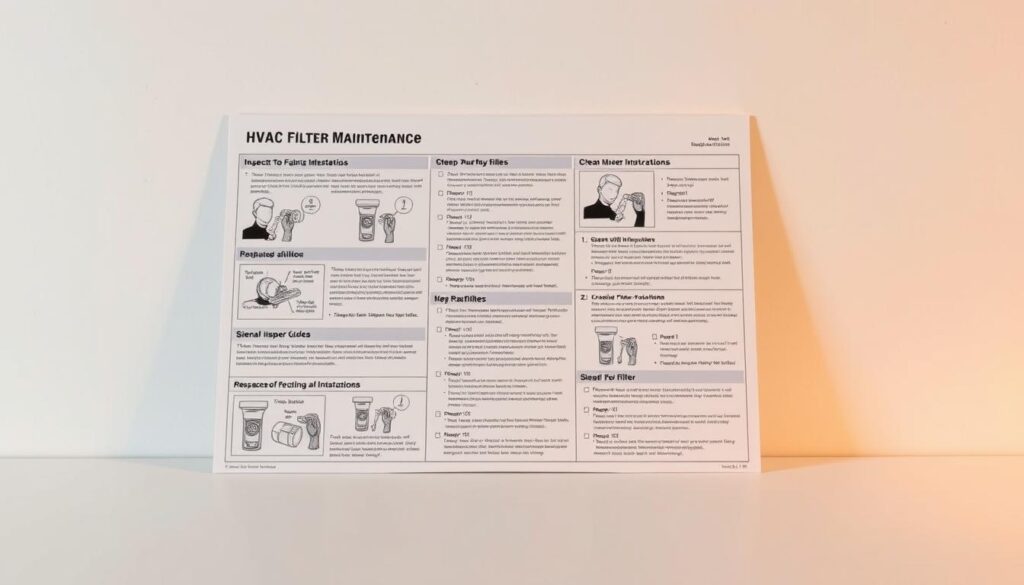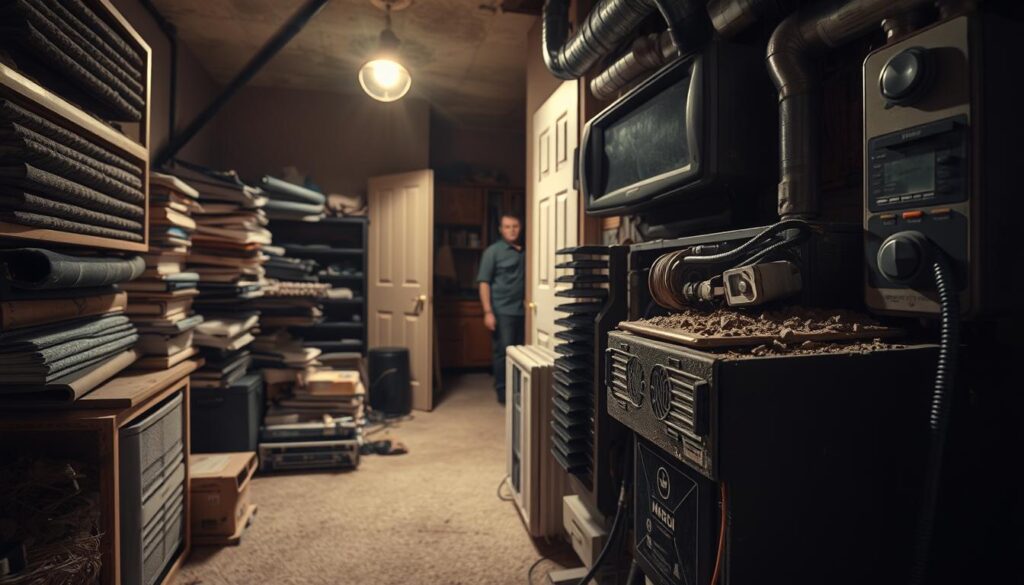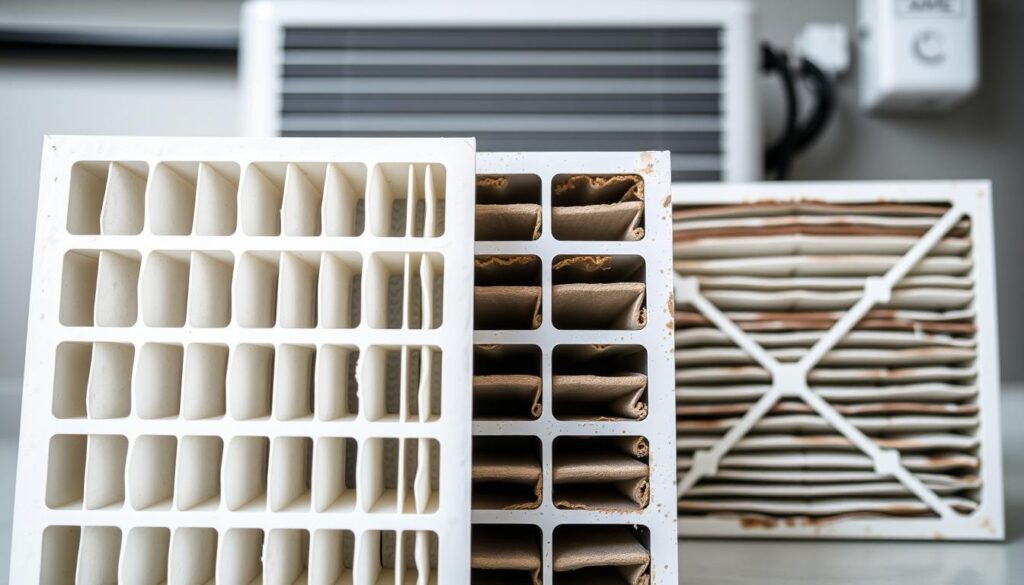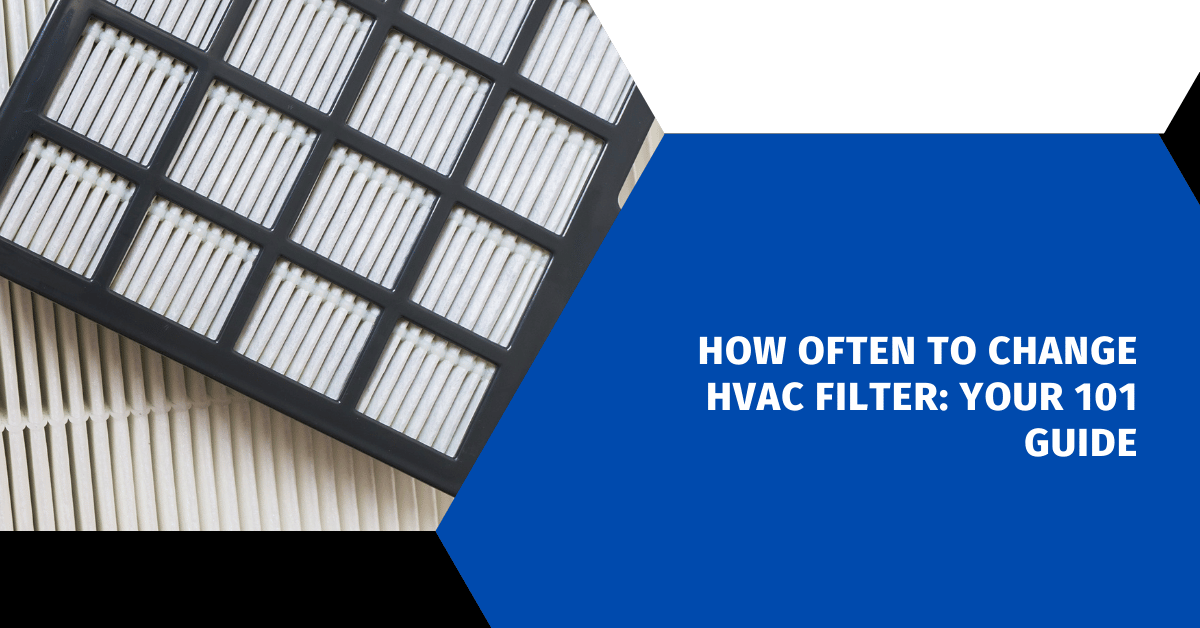Affiliate Disclosure
HVAC Guide Guys is a participant in the Amazon Services LLC Associates Program, an affiliate advertising program designed to provide a means for sites to earn advertising fees by advertising and linking to Amazon.
How Often To Change HVAC Filter? Ever felt like your home’s air is too thick or your energy bills are too high? It might be your HVAC filter’s fault. Knowing when to change it can keep your home healthy and efficient.

Your HVAC filter is a hero, catching dust, pollen, and tiny particles that harm your air. Changing it often is more than a chore—it’s a smart move for your comfort and health.
This guide will teach you all about keeping your HVAC system in top shape. We’ll cover filter types and when it’s time for a new one. You’ll learn how to breathe easier and keep your system running well.
Key Takeaways
- Regular HVAC filter changes improve air quality
- Different filters require different replacement schedules
- Clean filters enhance HVAC system efficiency
- Ignoring filter maintenance can lead to higher energy costs
- Filter replacement is a simple yet critical home maintenance task
Table of Contents
Understanding HVAC Air Filters and Their Importance
Your HVAC system’s heart beats through its air filter. It’s a key part that keeps your equipment safe and your air clean. Knowing about air filters is more than just upkeep. It’s about making your home healthier and keeping your heating and cooling working well.
Air filters are your HVAC system’s first defense. They catch harmful stuff before it can damage your home. When you do your furnace filter maintenance, check the filter’s state and when it needs to be replaced.
How Air Filters Protect Your HVAC System
Clean filters are essential for your HVAC system’s best performance. Dirty filters can lead to big problems:
- Less airflow and system efficiency
- Higher energy use
- More wear and tear on parts
- Greater risk of system failures
The Role of Filters in Indoor Air Quality
Changing your air filter regularly is key for clean indoor air. Filters catch tiny particles that can harm your breathing and comfort.
| Contaminant Type | Size Range | Health Impact |
|---|---|---|
| Dust | 1-100 microns | Respiratory irritation |
| Pollen | 10-100 microns | Allergy triggers |
| Pet Dander | 2-10 microns | Asthma risk |
| Bacteria | 0.2-10 microns | Potential infection |
Types of Contaminants Filtered
Modern HVAC filters catch a wide range of particles. From tiny dust mites to big debris, they work hard to keep your air and system clean.
Choosing the right filter depends on your needs. Think about allergies, pets, and your home’s air quality.
Explore Our HVAC Shop
Looking for top-rated HVAC tools, parts, and accessories? Visit our shop and find the perfect solution for your needs.
Visit the ShopHow Often to Change HVAC Filter: Essential Timeline Guide
It’s important to know when to change your air conditioner filter. This keeps your home’s air clean and your HVAC system running well. The time needed to change filters varies based on your home’s specific needs.
Standard disposable filters usually need to be replaced every 30-60 days. But, better filters can last up to three months. Remember, this isn’t true for every home.
- Standard filters: Replace every 1-2 months
- High-efficiency filters: Replace every 3 months
- Homes with pets: Consider monthly replacements
When deciding when to change your air conditioner filter, think about these important factors:
| Household Condition | Recommended Filter Change Frequency |
|---|---|
| No pets, minimal allergies | Every 90 days |
| One pet, moderate dust | Every 60 days |
| Multiple pets, allergies | Every 30-45 days |
Your local environment affects how often you need to change filters. Homes in dusty areas or near construction sites might need filters changed more often. This helps keep the air clean and your system working right.
Pro tip: Set calendar reminders or use smart home technologies to track your filter replacement schedule accurately.
Explore Our HVAC Shop
Looking for top-rated HVAC tools, parts, and accessories? Visit our shop and find the perfect solution for your needs.
Visit the ShopSigns Your HVAC Filter Needs Immediate Replacement
Keeping your HVAC system’s air filter clean is key for good air quality and system performance. Knowing when to replace your filter can save you money and avoid damage. The lifespan of your hvac system air filter depends on several important signs.
Understanding when to change your air filter is vital for your home’s air and HVAC system health. Look out for these critical warning signs:
Visual Indicators of a Dirty Filter
- Visible dust and debris accumulation on the filter surface
- Discoloration or gray/black appearance of the filter
- Noticeable buildup of particles around air vents
Performance-Related Warning Signs
- Reduced airflow from heating and cooling vents
- Uneven temperature distribution in your home
- Increased dust settling on furniture and surfaces
- Unusual whistling or rattling sounds from the HVAC system
Impact on Energy Bills
A dirty filter makes your HVAC system work harder, wasting energy. You might see:
- Unexplained spike in monthly energy costs
- Longer heating and cooling cycles
- Decreased overall system performance
By watching for these signs, you can keep your HVAC system healthy. This ensures clean, efficient air in your home.
Choosing the Right Filter Size and Type
Finding the right HVAC filter is key for clean air and a well-working system. Start by knowing the size and type that fits your heating and cooling system.
To find the right filter size, look at the numbers on your current filter. These numbers show length, width, and thickness. If these numbers are gone or hard to read, measure the filter yourself or check your HVAC manual.
- Common residential filter sizes range from 16×20 to 20×25 inches
- Thickness usually varies between 1-4 inches
- Always confirm exact measurements before purchasing
When thinking about how often to change your hvac filter, look at different types:
- Fiberglass Filters: They’re cheap but need to be changed more often
- Pleated Filters: They catch more dust and particles, good for most homes
- Electrostatic Filters: Use static electricity to trap contaminants
MERV ratings are important for how well a filter works. Most homes do best with filters rated 8-13. This balance keeps air quality good and airflow smooth.
Pro tip: Always prioritize proper fit over cost when selecting an HVAC filter.
The Impact of MERV Ratings on Filter Performance
Understanding MERV ratings is key to keeping your home’s air clean and your HVAC system running well. MERV (Minimum Efficiency Reporting Value) helps you pick the best air filter for your needs.
MERV ratings go from 1 to 20. Higher numbers mean better filtration. The right filter can greatly affect how often you need to change it and how well your system works.
Decoding MERV Ratings: What They Mean for Your Home
- MERV 1-4: Basic filtration, captures large particles
- MERV 5-8: Traps dust mites, pollen, and some bacteria
- MERV 9-12: Excellent for residential use, catches fine particles
- MERV 13-16: Hospital-grade filtration
Optimal MERV Ratings for Residential Systems
Most home HVAC systems do best with MERV ratings between 8 and 13. These ratings offer great air quality without hurting airflow or stressing your system.
Avoiding Over-Filtration Challenges
Choosing a filter with too high a MERV rating can cause big issues. High MERV filters can cut down airflow, raise energy use, and even harm your HVAC system. Always check your system’s maker advice for the best filter rating.
Pro Tip: Regularly check your filter’s performance and replace it according to the manufacturer’s recommended air filter change interval.
Explore Our HVAC Shop
Looking for top-rated HVAC tools, parts, and accessories? Visit our shop and find the perfect solution for your needs.
Visit the ShopCommon Mistakes in HVAC Filter Maintenance

Keeping your HVAC filter in good shape is not as simple as many think. People often make big mistakes when it comes to changing their filters. These errors can hurt your system’s performance and air quality inside your home.
Knowing when to change your air conditioner filter is more than just a simple reminder. Homeowners often fall into traps that can harm their HVAC system and raise energy costs.
- Selecting the wrong filter size for your specific HVAC system
- Incorrectly installing filters, creating air leakage points
- Neglecting regular replacement schedules
- Assuming higher MERV ratings always mean better performance
Choosing the right filter is key. Not all filters are the same, and using the wrong one can cause big problems.
| Common Mistake | Potential Consequences | Recommended Solution |
|---|---|---|
| Incorrect Filter Size | Reduced airflow, system strain | Measure HVAC system precisely |
| Infrequent Replacement | Higher energy bills, poor air quality | Replace every 60-90 days |
| Misunderstanding MERV Ratings | Potential system inefficiency | Consult HVAC professional |
Your HVAC system works best when you take care of it. Avoiding these common errors will keep your system running smoothly and your air clean.
Special Considerations for Different HVAC Systems
Not all HVAC systems are the same when it comes to air filters. The lifespan of your hvac system air filter can change a lot. This depends on the type of system you have in your home.
Different HVAC systems need different ways to replace and care for filters. Knowing these special needs helps you keep your air filters changed on time. This protects the air quality in your home.
- Furnace Systems: Usually use disposable filters that need to be replaced every 1-3 months
- Central Air Conditioners: Have similar filter needs to furnaces, with yearly maintenance checks suggested
- Heat Pumps: Often need more frequent filter changes because they run all year
- Ductless Mini-Split Systems: Have washable filters that need regular cleaning instead of being replaced
Always follow the guidelines from your HVAC system’s manufacturer for filter care. Some systems with whole-house air cleaners might need special filters. These needs can be different from what’s usually recommended.
Professional HVAC technicians can give you advice that fits your home’s system. They can help you keep up with the best maintenance schedule for your equipment.
Explore Our HVAC Shop
Looking for top-rated HVAC tools, parts, and accessories? Visit our shop and find the perfect solution for your needs.
Visit the ShopBenefits of Regular Filter Replacement

Following hvac filter change guidelines can make your home more comfortable and efficient. Regular filter replacement brings many benefits beyond just maintenance.
By keeping up with a schedule for changing hvac filters, you gain important advantages:
- Enhanced Indoor Air Quality: Clean filters catch dust, allergens, and pollutants, making the air fresher and healthier
- Improved HVAC System Performance: Clear airflow eases the load on your heating and cooling systems
- Energy Cost Savings: A clean filter makes your system work better, saving up to 15% on energy costs
- Extended Equipment Lifespan: Less wear and tear means fewer repairs and longer-lasting HVAC parts
Your HVAC system works hard to keep your home comfortable. By spending a little time on regular filter changes, you protect your indoor air and your equipment’s long life.
“Prevention is always more cost-effective than repair” – HVAC Maintenance Experts
The small effort of replacing your filter can lead to big gains in system performance, air quality, and home comfort.
Conclusion
Knowing when to replace your HVAC filter is key to a healthy home. Changing your filter regularly keeps your HVAC system running well and your air clean. It also stops your equipment from working too hard and saves energy.
Your home’s needs decide how often you should change your filter. Things like how many people live there, if you have pets, and the air quality in your area matter. Experts say to check your filter every month and change it every 60-90 days if you live in a typical house.
Keeping up with your HVAC filter is good for your home’s comfort and its long life. If you ignore your filter, your system might not work as well, use more energy, and could even harm your health. By watching your filter and changing it when needed, you keep your home clean and your HVAC system working well for longer.
Every home is different, so it’s important to watch your filter and adjust your changing schedule as needed. With what you’ve learned, you can take care of your HVAC filter and make your home a healthier place to live.

